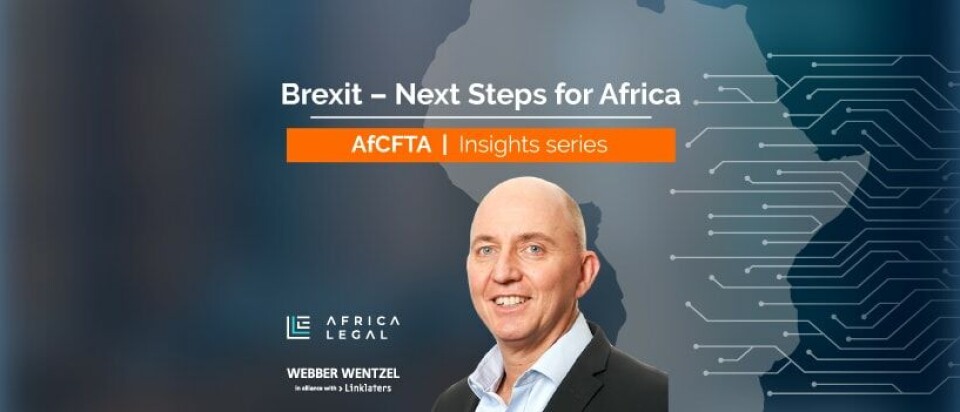Copyright : Re-publication of this article is authorised only in the following circumstances; the writer and Africa Legal are both recognised as the author and the website address www.africa-legal.com and original article link are back linked. Re-publication without both must be preauthorised by contacting editor@africa-legal.com
Brexit – Next Steps for Africa

In this interview, we speak to Daryl Dingley, partner at Webber Wentzel to get to the heart of the opportunities and challenges for African countries brought about by new bi-lateral trade agreements with the UK in the Brexit era.
The much-lauded AfCFTA has been heralded as a milestone for African economies and a gateway to prosperity for more than a billion Africans. Yet, challenging this collective economic spirit are the trade challenges brought about by Brexit and the mosaic of forthcoming and already established trade agreements between African countries and customs unions with the UK.
“We jumped in there and got ready for January 1, post-Brexit,” says Dingley in reference to SACU or the South African Customs Union’s entry into a trade agreement with the UK. (SACU includes South Africa, Lesotho, Eswatini , Namibia and Botswana.) The new agreement aims to smooth trading between these countries and the UK by establishing a shadow agreement that directly replicates the one already in place with the EU. The benefits will be felt almost immediately for these countries, especially for agricultural products, and have the added benefit of creating another lucrative market for trade beyond the EU.
But, the gains have not been and will not be shared equally for all African countries due to their own actions and the actions of the UK.
“A lot of African countries are behind the curve” says Dingley referring to the vast majority of nations that have not yet instituted an agreement or even started negotiations.
Some countries, such as Nigeria, have waited for the UK to reach out to them which can leave them running at a slower economic speed than those that have established these agreements.
“This is the wrong approach” says Dingley, “you have to be proactive.”
To help move continental progress towards more trade agreements with the UK, the British Government is hosting a virtual conference on 20 January 2021. This conference aims to help countries understand what is required for bilateral agreements.
However, the very large elephant in the room is the AfCFTA and what differing bilateral agreements mean for the success of this agreement, he says.
“Maybe disaster is the wrong word, but the fact that you have all these bilateral trade arrangements and regional trading blocs engaging with the UK separately – not at an African Union or African Free Trade Agreement level undermines the African Union 2063 vision. What you really want is the bloc of 52 countries to be collectively, as a unit, engaging with the UK.”
Dingley offers a few suggestions to African countries and regional trading blocs that have yet to conclude agreements with the UK.
First, there needs to be a close look at the diversification of the economies in the region and the lowering of various tariffs for countries to benefit from preferential trade arrangements from the UK.
If the UK wants to uplift these economies and Africa more generally, there needs to be a discussion around the areas where they want to establish infant industries that need a level of protection.
“The UK has enough things to worry about with regards to their arrangements with the EU – this process should have been driven more by Africa.”
The African Union, for instance, could have thought about entering into a bilateral agreement with the UK that incorporated some ideas about diversification and talked about transitional mechanisms to ensure it’s a smooth transition.
“Then, they should have looked at the main policy and industrial policy objectives and have identified the main investment areas that would be critical. Lastly, they should have engaged with the UK to try, for example, to encourage the UK businesses to invest in certain countries in the bloc to encourage intra-regional trade and then open up markets in a staged way.”
If firms want to expedite the process, Dingley says, potential clients should seek legal advice on the trade rules and trade finance, as well as transitional advice for countries that do not yet have these agreements.
Though the era of African trade with a newly “independent” UK is just beginning, Dingley is hopeful, calling it “early days” and seeing many future opportunities for mutually beneficial economic growth both bi-laterally and through the AfCFTA.
To join Africa Legal's mailing list please click here
